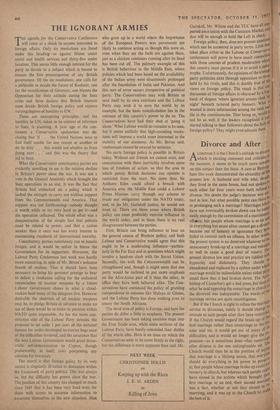Divorce and After
A LTHOUGH it is the Church's attitude to divorce, which is exciting comment and criticism a' the moment, it seems to be much more sensible on this subject than the State. A case at Birming° ham this week demonstrated the absurdity a the present law. A husband and wife who, though they lived in the same house, had not spoken la each other for four years were both refused a divorce. No doubt the judge's decision was CO rect in law, but what possible point can there ,hhe in prolonging such a marriage? Marriages whd have not irrevocably broken down can be eldest easily enough by the commission of a matrimonld offeace; btit people whose marriage is at an ea. in everything but name often cannot get a divore" because out of honesty or ignorance they Wive failed to commit such an offence. In other woru,s' the present system is no deterrent whatever to Me unnecessary break-up of a marriage and manage:, as well to cause a good deal of misery. °,1113 present divorce law and practice are riddled wit hypocrisy and dishonesty. They should .b,e abandoned and replaced by a system under whiclI marriage would be indissoluble unless either Par,t)r could show that it had broken down, The Arca; bishop of Canterbury got a bad press, but most what he said opposing the remarriage in church ciL the divorced was indisputable. The words of the marriage service are quite unambiguous. But if the Church is right to refuse the marriag,; service to divorcees, surely it should change:, attitude to such people after they have rentarrieu' If the Church would regard the break-up a ill,' first marriage rather than remarriage as the (1!ss aster and sin, it would get out of many of,,,,st, difficulties, and it would no longer give the' pression—as it sometimes does—that remartlave after divorce is the one unforgiveable sin. 1,11,, Church would then be in the position of saYinbe that marriage is a lifelong union, that everY°11, should do everything in his power to preserv; it; that people whose marriage broke up could.n2i remarry in church, but whereas such people plig; have sinned in the actions which brought tbeit, first marriage to an end, their second marrnlg, was a fact, whether or not they sinned ill marrying, and it was up to the Church to ma' the best of it.


































 Previous page
Previous page